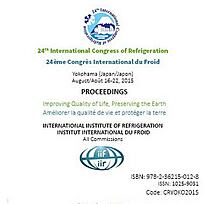
IIR document
Lumped heat and mass transfer model of the frost formation process.
Number: pap. n. 18
Author(s) : MOHS W. F., KULACKI F. A.
Summary
An important problem in the refrigeration industry is the formation of frost layers on sub-freezing surfaces of air coolers. The frost growth process is described by a set of partial differential equations that combines both the latent and sensible heat and mass transfer. A direct method to predict the heat transfer coefficient from the frosted surface would be desirable for system design engineers. We present a framework to determine the heat transfer coefficient from a frosted surface. The sensible and latent heat transfer coefficients are lumped into a single term, which is convenient for calculating the total heat transfer from the surface. The sensible portion of the heat transfer is calculated from common heat transfer correlation for flow over a surface, while the latent heat term is proportional to the growth in frost thickness. Any frost thickness growth model can be used with the described method, which has the added benefit of calculating the ratio of sensible to latent heat transfer. The results of the model are compared to measurement and show excellent agreement.
Available documents
Format PDF
Pages: 8 p.
Available
Public price
20 €
Member price*
Free
* Best rate depending on membership category (see the detailed benefits of individual and corporate memberships).
Details
- Original title: Lumped heat and mass transfer model of the frost formation process.
- Record ID : 30015052
- Languages: English
- Source: Proceedings of the 24th IIR International Congress of Refrigeration: Yokohama, Japan, August 16-22, 2015.
- Publication date: 2015/08/16
- DOI: http://dx.doi.org/10.18462/iir.icr.2015.0018
Links
See other articles from the proceedings (657)
See the conference proceedings
Indexing
-
Themes:
Heat transfer;
Mass transfer - Keywords: Frosting; Calculation; Mass transfer; Heat transfer; Model; Sensible heat; Latent heat
-
THE SIMULATION OF HEATING AND COOLING COILS FOR...
- Author(s) : HOLMES M. J.
- Date : 1982
- Languages : English
View record
-
Determining the performance of energy wheels. 1...
- Author(s) : SIMONSON C. J., CIEPLISKI D. L., BESANT R. W.
- Date : 1999
- Languages : English
- Source: ASHRAE Transactions. 1999 Winter Meeting, Chicago, Illinois + CD-ROM.
View record
-
Determining the performance of energy wheels. 2...
- Author(s) : SIMONSON C. J., CIEPLISKI D. L., BESANT R. W.
- Date : 1999
- Languages : English
- Source: ASHRAE Transactions. 1999 Winter Meeting, Chicago, Illinois + CD-ROM.
View record
-
Heat transfer in heat pipe evaporator with sint...
- Author(s) : MAZIUK V. V., KULAKOV A. G., VASILIEV V. L.
- Date : 1997/09/15
- Languages : English
- Source: 3rd International Seminar on heat pipes, heat pumps, refrigerators. Proceedings.
View record
-
Frost characteristics and heat and mass transfe...
- Author(s) : KWAK D. K., KIM S., CHO K.
- Date : 2012/06/25
- Languages : English
- Source: 10th IIR-Gustav Lorentzen Conference on Natural Working Fluids (GL2012). Proceedings. Delft, The Netherlands, June 25-27, 2012.
- Formats : PDF
View record
